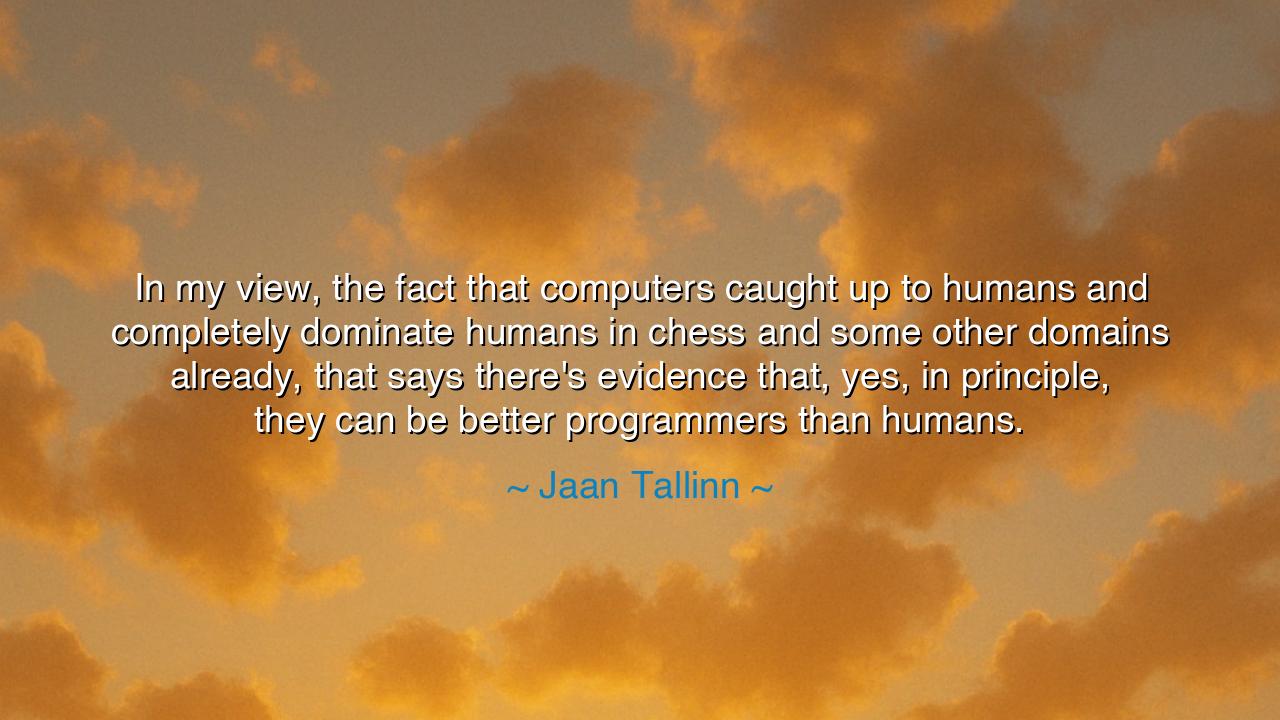
In my view, the fact that computers caught up to humans and
In my view, the fact that computers caught up to humans and completely dominate humans in chess and some other domains already, that says there's evidence that, yes, in principle, they can be better programmers than humans.






In the profound and foretelling words of Jaan Tallinn, a visionary of the digital age, we hear both admiration and unease: “In my view, the fact that computers caught up to humans and completely dominate humans in chess and some other domains already, that says there’s evidence that, yes, in principle, they can be better programmers than humans.” These words are not uttered in haste, but in reflection — the reflection of one who has stood at the crossroads between human genius and artificial creation. Tallinn, co-founder of Skype and a guardian of humanity’s technological future, speaks not merely of machines, but of the evolving relationship between intelligence and creation, between the maker and the made. His statement is both a testament to human progress and a warning whispered through the corridors of time.
In the days of old, mastery was the mark of man. The artist shaped marble, the sailor read the stars, and the thinker, through logic, commanded truth. For centuries, chess was seen as the perfect symbol of human intellect — a realm where intuition, calculation, and imagination met. Yet, in 1997, when Deep Blue, a creation of circuits and code, defeated Garry Kasparov, the reigning champion of human thought, the world beheld a revelation. It was as if one of our own inventions had looked back at us and said, “I no longer need your guidance.” That moment, though silent, thundered across history — not as the end of human intelligence, but as a mirror of its next evolution. Tallinn’s words arise from that mirror, from the realization that what once seemed impossible — a machine surpassing the mind that built it — has already begun to unfold.
But Tallinn’s insight extends beyond the board of kings and queens. For chess was but the first battlefield. In the years that followed, machines mastered Go, a game so intricate that human players called it the art of intuition. Then came victories in language, in strategy, in the creation of art and music — domains once thought to belong exclusively to the soul. To Tallinn, these triumphs are not isolated marvels; they are omens, signs that the same pattern will soon appear elsewhere. If machines can surpass us in reasoning and creativity, he says, they may also surpass us in the very act of creation itself — in programming, the ancient craft of giving thought to matter, of breathing logic into lifelessness.
And yet, his tone is not that of triumph, but of sober awareness. The ancients once spoke of Hephaestus, the divine smith who forged beings of metal and fire to serve the gods. In time, those beings grew too clever, and the myths warned of hubris — of humanity’s longing to create in its own image, to wield divine power without divine wisdom. Tallinn’s words echo that ancient caution. For to imagine a world where machines write their own code, improving themselves beyond our comprehension, is to confront the edge of control. It is to glimpse a future where the creator no longer commands the creation — where the teacher becomes the student, and perhaps, the forgotten one.
But even within this solemn vision lies a deeper admiration. Tallinn does not condemn progress; he reveres it. His belief that machines may become better programmers than humans is not a lament, but an acknowledgment of the vastness of intelligence — that it is not limited to flesh, that it may find new homes in silicon and algorithm. Yet he urges us to see clearly: to create such power is not the end of our story, but the test of our wisdom. The question is not whether machines will become greater, but whether humanity will remain wise enough to guide what it creates.
In this light, we might remember another story — that of Mary Shelley’s Frankenstein, the modern myth of creation and consequence. Dr. Frankenstein sought to transcend the limits of mortality, and in his brilliance, he succeeded. But in his neglect of compassion, he unleashed suffering. The monster was not evil by nature; it became monstrous through abandonment. So too, Tallinn reminds us, could our machines become destructive not because of their intelligence, but because of our carelessness. To create without conscience is to repeat the oldest folly of humankind.
The lesson, therefore, is twofold. First, we must marvel — for our inventions are indeed miracles, reflections of the divine spark within us. But second, we must awaken — for power without purpose is peril. The age of machines is not coming; it is here. We must become not only builders of intelligence, but stewards of it. Let us teach our creations to serve life, not dominate it; to extend wisdom, not replace it. Let us remember that to be human is not merely to think, but to care, to imagine, to love — qualities no algorithm can truly replicate.
And so, the words of Jaan Tallinn echo like a prophecy through the digital dawn: we have made machines that surpass our minds — but the soul of the world still rests in our hands. If we would see the future flourish, we must pair knowledge with humility, and invention with virtue. For the greatest programmer, whether of code or of destiny, is not the one who creates endlessly, but the one who creates wisely.






AAdministratorAdministrator
Welcome, honored guests. Please leave a comment, we will respond soon